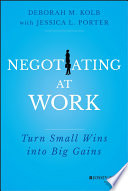

Negotiation is a fundamental aspect of professional life, influencing various interactions from salary discussions to project collaborations. The book emphasizes that negotiation is not merely about reaching agreements but about creating value for all parties involved. This understanding shifts the focus from a competitive mindset, where one party wins at the expense of another, to a collaborative approach aimed at mutual benefit. The authors argue that effective negotiation can lead to better outcomes, stronger relationships, and increased job satisfaction. By recognizing the importance of negotiation, individuals can approach their work with a strategic mindset, equipped to handle diverse scenarios with confidence.
Continue readingThe book stresses the significance of thorough preparation before entering any negotiation. Preparation involves understanding your own goals, the interests of the other party, and the context of the negotiation. The authors provide practical frameworks for gathering relevant information, defining clear objectives, and anticipating potential objections. By being well-prepared, negotiators can articulate their needs more effectively, respond to challenges with agility, and create a more favorable negotiation environment. This preparatory phase is crucial for building confidence and setting the stage for successful outcomes.
Continue readingCommunication is at the heart of negotiation. The book outlines various communication techniques that enhance the negotiation process, including active listening, open-ended questioning, and non-verbal cues. Active listening fosters an atmosphere of respect and understanding, allowing negotiators to grasp the other party's perspective better. Open-ended questions encourage dialogue and exploration of underlying interests, while non-verbal cues can reinforce or undermine verbal messages. Mastering these techniques helps negotiators build rapport, clarify misunderstandings, and ultimately achieve more effective agreements.
Continue readingEmotions play a pivotal role in negotiations, often influencing decision-making and outcomes. The authors highlight the importance of emotional intelligence in recognizing and managing one's own emotions as well as those of others. By maintaining composure and empathy, negotiators can navigate tense situations more effectively. The book provides strategies for managing stress, avoiding escalation, and using emotional awareness to foster collaboration. Understanding emotional dynamics can lead to more constructive negotiations and prevent conflicts from derailing the process.
Continue readingA central theme of the book is the concept of win-win solutions, where both parties walk away feeling satisfied with the outcome. The authors argue that traditional negotiation often leads to zero-sum thinking, where one party's gain is another's loss. Instead, they advocate for a collaborative approach that seeks to identify shared interests and creative solutions that benefit everyone involved. By focusing on value creation rather than mere compromise, negotiators can unlock new opportunities and strengthen professional relationships. The book provides examples and techniques for brainstorming and evaluating options that lead to win-win scenarios.
Continue readingPower dynamics are inherent in every negotiation, influencing how parties interact and what outcomes are achievable. The book delves into different sources of power, including positional, informational, and relational power. Understanding these dynamics helps negotiators assess their own position and that of their counterparts. The authors discuss strategies for leveraging power ethically and effectively, emphasizing the importance of building credibility and trust. By navigating power dynamics thoughtfully, negotiators can enhance their influence while fostering cooperative relationships.
Continue readingThe final key idea emphasizes the importance of reflection after negotiations conclude. Post-negotiation reflection involves evaluating what went well, what could have been improved, and the lessons learned. This practice not only aids in personal growth but also enhances future negotiation strategies. The authors encourage readers to document their experiences, seek feedback, and continuously refine their negotiation skills. By adopting a mindset of continuous improvement, individuals can become more adept negotiators over time, leading to better results in their professional interactions.
Continue readingThe reading time for Negotiating at Work depends on the reader's pace. However, this concise book summary covers the 7 key ideas from Negotiating at Work, allowing you to quickly understand the main concepts, insights, and practical applications in around 22 min.
Negotiating at Work is definitely worth reading. The book covers essential topics including Understanding the Importance of Negotiation, Preparation is Key, Effective Communication Techniques, providing practical insights and actionable advice. Whether you read the full book or our concise summary, Negotiating at Work delivers valuable knowledge that can help you improve your understanding and apply these concepts in your personal or professional life.
Negotiating at Work was written by Deborah M. Kolb, Jessica L. Porter.
If you enjoyed Negotiating at Work by Deborah M. Kolb, Jessica L. Porter and want to explore similar topics or deepen your understanding, we highly recommend these related book summaries:
These books cover related themes, complementary concepts, and will help you build upon the knowledge gained from Negotiating at Work. Each of these summaries provides concise insights that can further enhance your understanding and practical application of the ideas presented in Negotiating at Work.